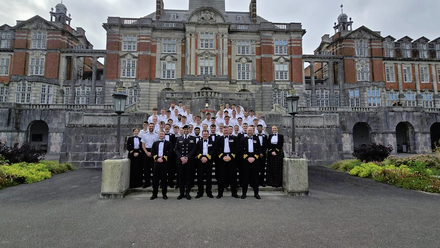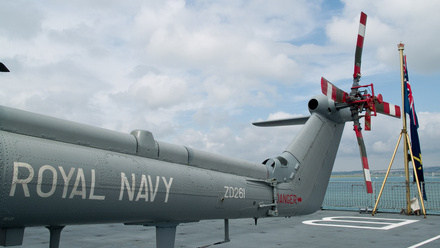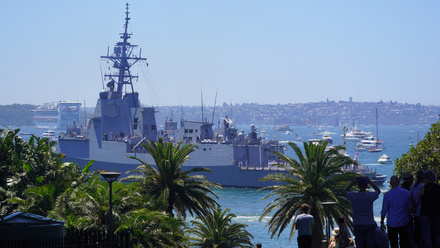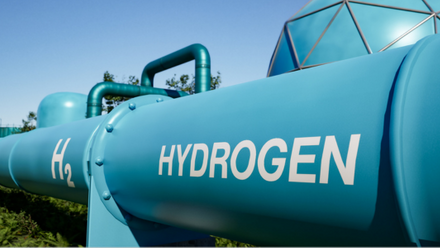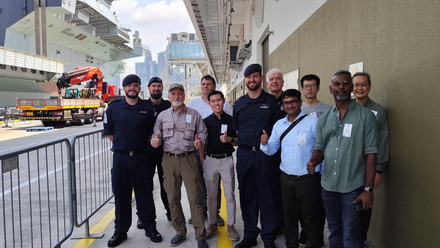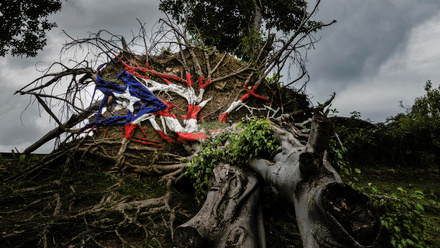Interview: from kickboxing to ship management
We sit down with Alasdair Wishart, IMarEST’s newly appointed Technical and Policy Director.
Tell us about your background and how you came to join IMarEST
I graduated from Heriot-Watt University around 2007 in automotive engineering. My objective at the time was to go into the automotive industry, but many of those jobs were no longer available or needed far more experience than I had as a fresh graduate. I then decided to have a reset and went off to Dalian Maritime University for a Chinese language course.
Back in the UK, through my kickboxing, I spoke with someone who was an Electro Technical Officer with P&O Cruises, and they said that Carnival UK were taking on graduates for a fast-track cadet entry scheme. I qualified and became an engineering officer and began working through the ranks on various cruise ships, did some dry docks, but then started to feel the effect of the resource strategy changes and decided to try shoreside. I then moved on to working with MOL LNG Transport Europe as an Assistant Superintendent, quickly moved to Technical Superintendent, Fleet Manager, and finally General Manager.
What drew you away from ship management?
I have been working for about 13 and a half years in ship management, which is quite frantic and busy. MOL LNG commenced, and continues with, a huge consolidation of ship management services, and I was to become a director of their new Singapore headquarters. However, it needs a team who can spend 24/7 on the job, setting up from scratch, scaling up a super ship management company, which I was doing, but at the expense of family life. I've got a two-year-old and a four-year-old. My wife is from Trinidad, and my parents are from Scotland, so social support is not available.
Besides, after 13 and half years of working in ship management, it's good to break from the norm and face fresh challenges.
How do you see your technical background fitting into IMarEST's broader scope?
It's not for me to be the expert on everything, but to use my management skills to learn and support the construction and execution of a relevant technical plan. For example, we've got the two technical journals – the Journal of Operational Oceanography and the Journal of Marine Engineering & Technology. I have to identify and understand the network of oceanography better, see how the science part fits into that and establish the linkage of how that supports the technical plan. I'm not going to lie - that's definitely going to be part of my learning process!
What are your immediate priorities?
I've got a 90-day plan. Within 30 days, I need to complete the learning process. Then, between 30 and 60 days, I need to consolidate - have I identified and documented all the processes? How do you measure progress, and what's effective? Then, at 60 to 90 days, I need to come up with a plan for where we're going.
I can add value by placing more structure into how we approach technical subjects and policy, so we're relevant, all pointing in the same direction and can work effectively in the way that members want us to. Having a coherent technical strategy means we all know what we're doing, we're moving forward in the same step, and we can start to see some tangible results.
How do you plan to enhance value for members?
We've got so many talents within the membership who are waiting to engage, and we've got high potential tools like IMarEST Connect to support the community. It's about listening to why and doing something about it. Once we achieve appropriate utilisation and build on the quality data within our systems, we can start analysing to enhance relevant inputs to strategy and planning, and identify metrics for the better understanding of our successes and areas for attention.
A key focus will be the Special Interest Groups (SIGs), which are the heartbeat of IMarEST. I want to understand the governance better and tighten it up so that expectations from members and the organisation are clear.
I want to get to the point where members can be proud to say we've got this industry respected SIG portfolio, and this is what they're working on to support our relevant technical strategy, and this is our contribution to the industry. Finally, we will get better at recognising significant member contributions. Longer term, we will build the Institute's credible global reputation as the ‘go to’ place for marine expertise.
Read more: New technical leadership announced within IMarEST.
Tell us what you think about this article by joining the discussion on IMarEST Connect.
Newsletter image: Alasdair Wishart, IMarEST’s Technical and Policy Director. Credit: IMarEST.
Main image: cruise ship Carnival Conquest docked at Nassau Harbour. Credit: Shutterstock.

